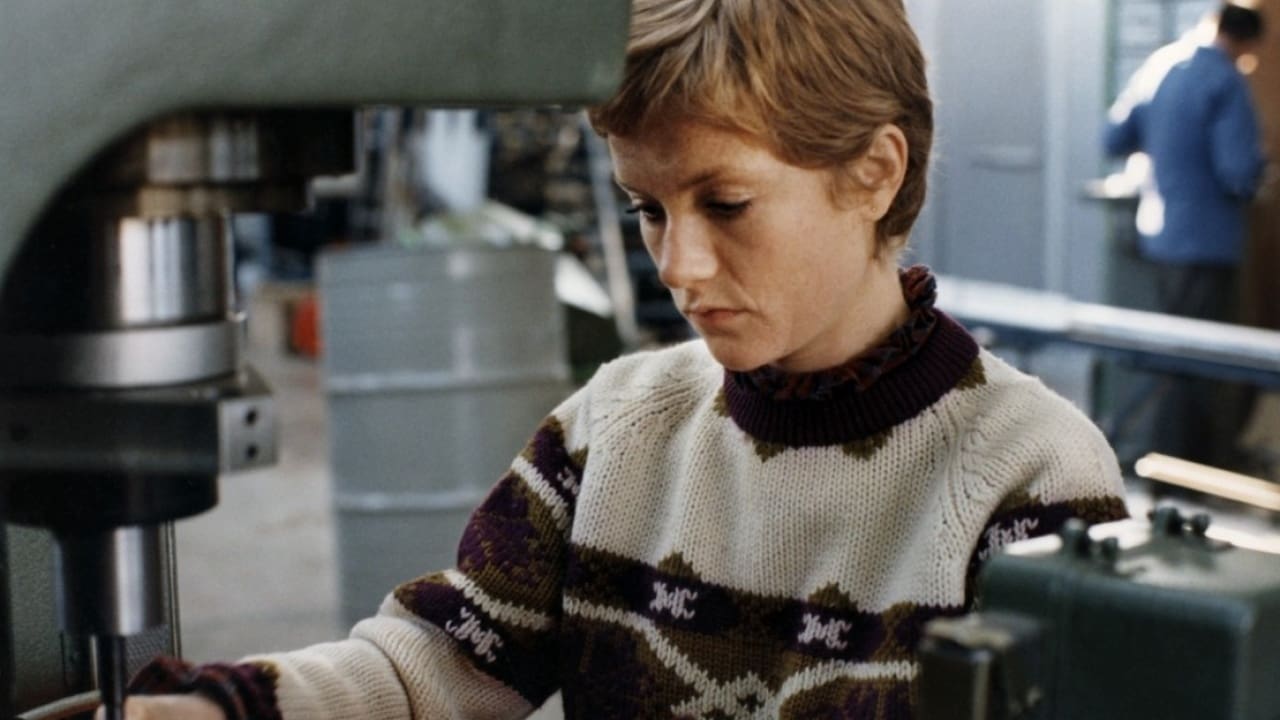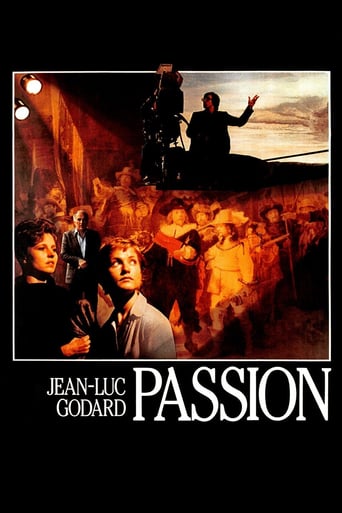Linbeymusol
Wonderful character development!
TrueJoshNight
Truly Dreadful Film
CommentsXp
Best movie ever!
WillSushyMedia
This movie was so-so. It had it's moments, but wasn't the greatest.
Claudio Carvalho
Sometimes I question myself why I insist on watching films made by Jean-Luc Godard, the most overrated and pretentious director of the cinema history. "Passion" has not been released on VHS or DVD in Brazil, but I have unfortunately bought an imported VHS and today I have decided to watch it. What a waste of time! There is neither storyline nor screenplay; the characters have the first name of each actor or actress; there is no edition and the viewer sees disjointed scenes on the screen. This dreadful mess is about a Polish director, who is the alter-ego of Godard, that is filming a movie without story or money and has simultaneous affair with the owner of a hotel and a worker of a factory. My vote is one (awful).Title (Brazil): Not Available.
aross-618-442420
In narrative painting, a story is told by the image, either through the composition or devices such as registers or continuous narrative. In a film, the story and image are separate and the image is usually a reenactment of the story. Jean-Luc Godard would say (and has said, more or less) that all art forms have an interrelationship and interchangeability. With this philosophy in mind he used his work to try to break down film from its conceptual boundaries of the narrative. In a sense this is a beautiful gesture, and I'm not denying this, but this manifesto-based approach to art- making leads to a lot more of explaining yourself than creating original work. The Godard film I want to put in question is called Passion (1982). It scandalizes the film vernacular of that postmodern trope, the film within the film. It goes behind the scenes of film-making, but the mock-film, which is also titled Passion, has no plot. It simply recreates a few painting "masterpieces" on film with real characters, on a real scale. The seminal painting- reenactment is Eugene Delacroix's The Entry of the Crusaders into Constantinople. Delacroix truly wanted to revolutionize narrative painting of the Romantic period in France. He was fed up with the conservatism introduced by painters like David. So rather than painting simple, yet psychological moments in a narrative like The Death of Marat, he tried to expand the modes of depicting narrative. The result of this effort is evident in The Entry of the Crusaders into Constantinople, completed in 1838, at the height of his career. His mode for this painting is somewhere between narrative registers and a theatrical moment (such as the moment Géricault chose for Raft of the Medusa). Elements of story are scattered around the chaos of the historical event: a woman kneels over her fallen friend, an old man tries to protect a young woman from the crusaders on horseback, another man fights a soldier on the steps of a temple, etc. At face value, it looks a bit like an epic painting, but it isn't. Epic paintings always have a shining moment; in Delacroix's, every moment shines in its own way. So while Delacroix's practice wasn't necessarily interdisciplinary, it most certainly zigzagged across painting genres. This aspect of the work is probably one of the Godard's interests in Delacroix, being that Godard was a seminal figure in the development of the shiftiest art movement to date, postmodernism. The understanding that there are separate shining moments in both Godard's Passion and Delacroix's The Entry of the Crusaders into Constantinople is very important to the interpretation of these works. As Jerzy, the director of Godard's film within the film said, "An image is not beautiful because it is brutal and eerie it is because the solidarity between ideas is distant and just." This line is incredibly profound, because it lays out the truth of art and life in general before the work; that truth is that all ideas are conceived disparate from one another because ideas come out of experience, which coincidentally is a paraphrasing of another one of Jerzy's lines. This idea becomes more important as the movie progresses. The other painting-reenactments, which appear closer to the beginning of the movie, are simply still images transferred to three dimensions and then recorded on film; but when he gets to the Delacroix scene (which was the most modern of the paintings and also stretched the concept of narrative the most), he is true to his philosophy. The characters begin the scene by reenacting the sacking of Constantinople, so as to have the experience, each one on an individual level, to be able to depict it. The action, which was being filmed, didn't even seem important to the filmmakers, in fact some of the production assistants were yelling at the actors (especially the women who were pretending rather convincingly to be raped and harassed) to get back into their places, as if they were supposed to be standing still. The action became a way for the still image to fall into place on a more real level than could be composed (a testament to Godard's philosophies). So there you have it, another piece of writing about ambitious men who wanted to make their mark on civilization (and if you pay attention to the gender relations in this movie, this is appropriate to mention). There's a lot of pressure out their for the ambitious man, and he is extremely sensitive. It's a tiring job for people who are more interested in theory than something more tangible (medium over message). And so they deal in epics and ambiguity. Godard, intent on advancing the medium of film is torn between writing stories and making abstractions that somehow incorporate characters. His answer, make a film about a filmmaker, making a film with master paintings in it. In the end, he creates a crypt filled so much with briefly explored theories (which may be too much to really comprehend) that it essentially becomes meaningless. Let's face it, Godard's Passion is a puzzle, and Delacroix's The Entry of the Crusaders into Constantinople is a puzzle with historical information behind it. I'd have to say that watching Godard's Passion was like being spoon-fed personal beliefs; not a work, but his philosophy. But, I liked it. As an artist, it is liberating to think of what Godard proposed with his reenactment of the invasion of Constantinople. Maybe if I get into the right groove, my work will somehow form out of a rehashing of my experiences, and I can make my experiences as exciting as a reenactment of The Entry of the Crusaders into Constantinople.
stevemac
If one were to hold up a camera to life and to film for ninety minutes, the result would be, more than likely, a boring snapshot of the banal and mundane. These snapshots of life would have no narrative, would be disjointed and chaotic, for such is life. Godard's Passion struck me as just that, a snapshot of the banality of life, the disconnected, seemingly meaningless misadventures of ordinary people, captured in one moment of time. But of course, these are not ordinary people in ordinary circumstances, these are the creations of Godard's imagination, yet the presentation of the content of the film is without structure, narrative or any of the Hollywood conventions of 'good filmmaking'. I found the film compelling and intriguing; I wanted to know more about the people and the universe that they populated. The lack of narrative structure was not a negative factor in my enjoyment of the film, for the anarchic content was, of itself, enough to keep my mind from wandering away from it. Godard's reflexive jibes at cinema convention were acerbic and witty, carrying with them a tremendous knowledge of the mechanics of filmmaking. The story of Passion, what story there is, is subservient to the process of filmmaking and Godard's desire to subvert it. For me, that is what makes this film so entertaining.The influence of Godard's work on other filmmakers is probably most profound in European cinema where the role of the Auteur is, if not quite nurtured, respected. It was a delightful surprise for me when, having seen Passion, I began to draw connections between Godard's storytelling and popular TV comedy. The First Series of the BBC comedy 'The Office', by Ricky Gervais and Stephen Merchant, leapt to mind as I mulled over Passion. The non-structure of Passion is very much evident in The Office, where the stories unfold as snapshots and moments in time, captured, and heavily influenced by the presence of the cameras. The Office is probably the most original piece of TV comedy since Monty Python's Flying Circus, yet I can see the influence of filmmakers like Godard in its presentation. Although there exists an A plot, B plot and guest plots, typical TV structure, in The Office, it is the presentation that makes all the difference. If handled in a more traditional fashion, it is highly unlikely that The Office would ever have been made, never mind popular. Even the origins of The Office pay homage to the anti-structural approach of filmmakers like Godard. Conceived and performed as an adlib piece on a BBC director's course by Gervais and Merchant, it shined with originality and a deep knowledge of and healthy disrespect for, convention; much like Godard really.The success of The Office owes much to its originality and wit but also to the possibility that the audience is searching for a new experience in terms of storytelling both on television and film. The irony is that this type of storytelling has been with us since Godard and long before Godard. Perhaps the audience has finally caught up with the filmmakers.
sbahlin
Despite the idiocy of the last comment there is an awful lot to be loved about Passion. The almost overstyled interiors of the studio set, complete with Painting Concrete (if you will) while the director and producer wander about discussing exactly how much per day it costs. Love it!The narrative (yes it is there, just let your mind wander) is simple and familiar, the in jokes are hilarious, and the atmosphere, especially at the end scene with the ship in the forest is, at times, breath taking.Yes it is dis-continuous, it is a film by JEAN-LUC GODARD! What do you expect. If you hate him, you'll hate this, if you love him, then this is destined to be one of your favourite JLG films (if you like his "mature" style that is).

